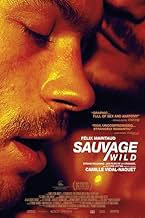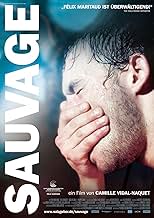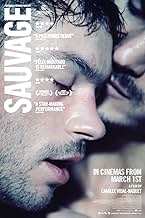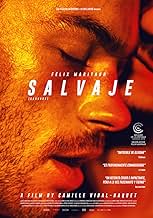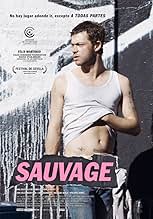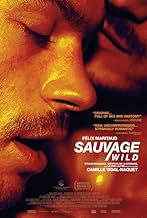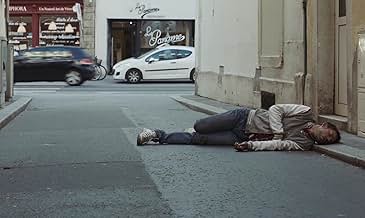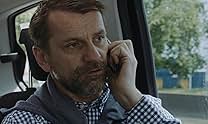AVALIAÇÃO DA IMDb
7,1/10
5,9 mil
SUA AVALIAÇÃO
Leo tem 22 anos e vende seu corpo na rua por um pouco de dinheiro. Os homens vêm e vão, e ele fica ansiando por amor. Ele não sabe o que o futuro trará.Leo tem 22 anos e vende seu corpo na rua por um pouco de dinheiro. Os homens vêm e vão, e ele fica ansiando por amor. Ele não sabe o que o futuro trará.Leo tem 22 anos e vende seu corpo na rua por um pouco de dinheiro. Os homens vêm e vão, e ele fica ansiando por amor. Ele não sabe o que o futuro trará.
- Direção
- Roteirista
- Artistas
- Prêmios
- 10 vitórias e 17 indicações no total
Farid-Eric Bernard
- Ahd
- (as Éric Bernard)
Noureddine Maamar
- Garçon de la bande
- (as Nour-Eddine Maamar)
Lou Volchitsa Ravelli
- Ana (de la bande)
- (as Lou Ravelli-Avanissian)
Avaliações em destaque
I watched this movie on the evening of March 3, International Day for the Rights of Sex Workers.
I felt how bad it was to be abused.
It is a movie that people can watch to understand what sex workers, male sex workers, LGBTI+ sex workers, gay male sex workers and all sex workers in general are going through.
The film centers around a young gay man and his love for his close friend who is heterosexual but has sex with men for money. In addition, the movie shows the sex work of a gay male man and what happens to sex workers.
I hoped the ending of the movie was different, but that's okay. It was a movie that I watched with interest.
I felt how bad it was to be abused.
It is a movie that people can watch to understand what sex workers, male sex workers, LGBTI+ sex workers, gay male sex workers and all sex workers in general are going through.
The film centers around a young gay man and his love for his close friend who is heterosexual but has sex with men for money. In addition, the movie shows the sex work of a gay male man and what happens to sex workers.
I hoped the ending of the movie was different, but that's okay. It was a movie that I watched with interest.
10dakjets
A cruel, brutal and honest depiction of life as a young male prostitute in Paris. Leo lives in a very destructive existence. The movie takes us straight into life and does not hold back for how tough this life is. Felix Maritaud is fantastic in the role of Leo, and is able to express the despair he often experiences. But he also produces a protagonist who may not be able to change his existence (for reasons we do not know). Although the film is both brutal and intense, it also has warmth and shows friendship in a credible way. I also want to draw the effort to Eric Bernad in the role of Ahd. The relationship between him and Leo is one of the film's best scenes, but also the most demanding to be able to relate to. Frankly, I think the movie shows a harsh reality, perhaps in a closed world for most of us. The director will be praised for making a film that really manages to depict a human being in a merciless world. But the movie is also about that despite a tough situation, it's always the choice we take that has consequences. That way, the film does not produce these people as victims, but as living individuals who choose to live their lives, different from most of us. A strong movie, on many levels. Highly recommended.
Leo is a 22 year old prostitute, in love with another male prostitute; only the guy he's in love with is heterosexual. He clearly cares for Leo, but cares more about his material well-being, even if it means 'bunking up' with an old man. Leo is different. He needs love, but not forced love. But at what cost? A slowly affecting drama which made me appreciate the love I have. 7.5 out of ten
I was not drawn to see Sauvage, but did so because a friend asked me. I won't outline the story because that's already been addressed, but I will say that I found Sauvage interesting, moreso perhaps because the director was present for a post-screening Q&A when I saw it as part of MoMA's New Directors Festival. One of the things this film expresses for me is that even though the world seems to group gay people and the gay existence as some kind of collective, group experience, it's really a very individual journey that each person confronts, deals with, and ultimately goes through on their own. The main character in Sauvage certainly has a unique perspective on life and living, and one that I doubt even has anything to do with the fact that he is gay. There's plenty of nudity, sex, and drug use, but none of it feel gratuitous or cheap. This film will be a bit too raw for many, but if you have even an ankling to check it out I suggest you do so.
Sauvage is the debut film of writer/director Camille Vidal-Naquet, a former professor of film studies, and takes as its subject the daily grind of a male prostitute. Striking a delicate balance between misery porn and objectively delineating the day-to-day of being a sex worker, the film is undeniably bleak, but it's not what you would define as miserablism. Remaining detached from what it depicts, it adopts a clinically dispassionate approach, one that remains always non-judgemental. Intermixing the degrading reality of selling one's self with unexpected moments of tenderness and warmth, Vidal-Naquet taps into something deeply compelling. Some will be put off by the (very) graphic sex scenes, the passivity of the main character, or the lack of much of a plot. However, for everyone else, although it certainly isn't multiplex fare, there's a hell of a lot to admire here.
Set in Strasbourg, Sauvage tells the story of Léo (an extraordinarily committed performance from relative newcomer Félix Maritaud), a homeless, drug-addicted male prostitute, whose name, like those of his fellow sex workers, is never spoken in the film. As the film begins, Léo is attending a doctor (Lionel Riou), revealing bruises, a split lip, a nasty cough, and stomach pains. Upon examining him, the doctor appears to begin sexually molesting him. However, all is not as it seems in the scene, which is a genius way to open the movie. The episodic narrative then follows Léo from one sexual encounter to the next, occasionally focusing on his relationship with gay-for-pay prostitute Ahd (Farid-Eric Bernard), with whom he is in love. Wearing perpetually filthy clothes, he drinks from gutters and eats from bins, has a litany of physical ailments, and on two occasions, other characters comment that he smells bad.
In preparation for making the film, Vidal-Naquet joined an outreach charity as a way to meet young male prostitutes. Intending to go on only a few runs over the course of a couple of weeks, he ended up spending three years visiting the men, all the while refining the script to make it as true to life as possible (all of Léo's sexual encounters in the film come from stories told by the actual sex workers).
The film reveals nothing about Léo's background - where he comes from, how he became a prostitute, where are his family - and many of the choices he makes prompt more questions than answers, with much of what he does tied to his notions of personal freedom. Even his final choice, which is undeniably selfish and ill-advised, is consistent with the psychology of the character as seen up to that point. He isn't especially interested in a life away from drugs and prostitution, and so he takes the violence, degradations, and humiliations, because every now and then he meets someone who provides him with a degree of transitory happiness.
Léo doesn't share in the detachment, coldness, or bitterness of his fellow prostitutes, with all of them finding it bizarre that he's willing to kiss clients. However, the important point is that Léo doesn't kiss on-demand, he does so only when it feels right. This in and of itself illustrates how different he is from the others, and how selling himself is not exclusively monetary - he is searching for genuine affection, and he seems incapable of establishing the same boundaries between himself and his clients as the other sex workers live by. He gives much more of himself than them, in the hopes of establishing a genuine human connection with someone. Indeed, Ahd says at one point, "it's like you enjoy being a wh-re", which he doesn't actually deny.
His fellow prostitutes are healthier, cleaner, more financially independent, more aware of the dangers of their occupation, never allowing emotions to become involved. But Léo is far more tender than any of them, and for all the harshness of his life, there is something Emersonian about him. Indeed, for much of the film, he has a pseudo-transcendentalist soul - he is relatively free of the norms of society and its institutions; he is at peace in and with nature; he lives very much in the moment; he has almost no materialist needs whatsoever; he trusts completely in his own instincts, he never lets go of his hope of finding love. This is why a scene involving a female doctor (Marie Seux) is so important; treating him with respect and empathy, when she attempts to examine him, he hugs her, and they hold each other for a moment, in an embrace that has nothing to do with sexuality and everything to do with kindness and emotional support.
Obviously, for a film of this nature to be in any way realistic, it must depict sexuality, and Vidal-Naquet doesn't hold back on that front. At the screening I attended, five people walked out within the first half-hour, by which time there had already been three graphic sex scenes (including a threesome with two prostitutes and a disabled man in a wheelchair). What's interesting about these scenes, however, is that they never lose their potency, irrespective of how many we see. I think the reason for this is how Vidal-Naquet presents them; far from filming them in a voyeuristic way or as titillation, they are instead presented dispassionately as something that happens to people in this line of work, as normal for Léo as taking drugs or sleeping rough - it's simply a part of his life.
Cinematographer Jacques Girault employs a pseudo-documentarian cinéma vérité aesthetic; the entire film is shot handheld, with an occasional loss of focus, frequent awkward compositions, and even losing the subject momentarily in the frame before picking him up again. This has the effect of neither depicting sexuality as something perverted and dirty, nor valorising it as the most important part of a relationship. By presenting it as simply a part of Léo's life, Vidal-Naquet normalises it. He certainly doesn't gloss over the problems of this kind of life, or the sexual perversions one may encounter, but he doesn't present sex work as, in and of itself, fundamentally immoral. Instead, he depicts both sides of the coin; from non-sexual intimacy with an elderly bookseller (Jean-Pierre Baste) who simply wants someone to read to him to a demeaning threesome with a couple (Nicolas Fernandez and Nicolas Chalumeau) who have Léo stand naked in front of them as they discuss how bad he smells, before roughly using a sex toy that would make even the ladies of LegalPorno winch. Indeed, Vidal-Naquet gets his point across about the highs and lows of sex work with a very simple edit - the film cuts from Léo lying peacefully in bed with the bookseller to giving a rough blowjob to a client in a car parked in an alley.
In terms of problems, as already stated, many will find the graphic sex scenes too much. Another issue is that Léo is an extremely passive character; he doesn't so much drive the plot as the plot depicts things that happen to him. Coupled with this, he doesn't have much of an arc, and at the end, he isn't overly different from the man we met at the beginning. With him being in every scene, almost every shot, the other prostitutes are very thinly sketched (even Ahd), but this is by design. On the other hand, the depiction of Claude (Philippe Ohrel), a magnanimous and kindly middle-aged man who takes a liking to Léo and immediately opens his home to him, is open to criticism; in a film founded on realism, he is something of a deus ex-machina, arriving in Léo's life just as he reaches his lowest point.
On paper, Sauvage should be a textbook case of misery porn, following as it does a homeless drug-addicted male prostitute and his often demeaning sexual encounters. However, Vidal-Naquet's non-judgemental depiction of Léo's occupation and milieu allows the more optimistic elements of his personality to rise to the surface, even in the face of seemingly endless degradations. It's certainly not an easy watch, but amidst the depravity, Vidal-Naquet finds moments of tenderness, moments which mean everything to Léo. Uninterested in titillation, the film depicts sexual activity as something that happens, without judgement or commentary. And by so doing, it avoids, for the most part, the clichés so inherent to films dealing with prostitution. Neither condemning Léo's lifestyle nor valorising it, no matter how demeaning or brutal it becomes, he always seems to find a way to keep going. That may be interpreted as tragic, but that's not the way Léo looks at himself, nor is it the way Vidal-Naquet wants us to look at him.
Set in Strasbourg, Sauvage tells the story of Léo (an extraordinarily committed performance from relative newcomer Félix Maritaud), a homeless, drug-addicted male prostitute, whose name, like those of his fellow sex workers, is never spoken in the film. As the film begins, Léo is attending a doctor (Lionel Riou), revealing bruises, a split lip, a nasty cough, and stomach pains. Upon examining him, the doctor appears to begin sexually molesting him. However, all is not as it seems in the scene, which is a genius way to open the movie. The episodic narrative then follows Léo from one sexual encounter to the next, occasionally focusing on his relationship with gay-for-pay prostitute Ahd (Farid-Eric Bernard), with whom he is in love. Wearing perpetually filthy clothes, he drinks from gutters and eats from bins, has a litany of physical ailments, and on two occasions, other characters comment that he smells bad.
In preparation for making the film, Vidal-Naquet joined an outreach charity as a way to meet young male prostitutes. Intending to go on only a few runs over the course of a couple of weeks, he ended up spending three years visiting the men, all the while refining the script to make it as true to life as possible (all of Léo's sexual encounters in the film come from stories told by the actual sex workers).
The film reveals nothing about Léo's background - where he comes from, how he became a prostitute, where are his family - and many of the choices he makes prompt more questions than answers, with much of what he does tied to his notions of personal freedom. Even his final choice, which is undeniably selfish and ill-advised, is consistent with the psychology of the character as seen up to that point. He isn't especially interested in a life away from drugs and prostitution, and so he takes the violence, degradations, and humiliations, because every now and then he meets someone who provides him with a degree of transitory happiness.
Léo doesn't share in the detachment, coldness, or bitterness of his fellow prostitutes, with all of them finding it bizarre that he's willing to kiss clients. However, the important point is that Léo doesn't kiss on-demand, he does so only when it feels right. This in and of itself illustrates how different he is from the others, and how selling himself is not exclusively monetary - he is searching for genuine affection, and he seems incapable of establishing the same boundaries between himself and his clients as the other sex workers live by. He gives much more of himself than them, in the hopes of establishing a genuine human connection with someone. Indeed, Ahd says at one point, "it's like you enjoy being a wh-re", which he doesn't actually deny.
His fellow prostitutes are healthier, cleaner, more financially independent, more aware of the dangers of their occupation, never allowing emotions to become involved. But Léo is far more tender than any of them, and for all the harshness of his life, there is something Emersonian about him. Indeed, for much of the film, he has a pseudo-transcendentalist soul - he is relatively free of the norms of society and its institutions; he is at peace in and with nature; he lives very much in the moment; he has almost no materialist needs whatsoever; he trusts completely in his own instincts, he never lets go of his hope of finding love. This is why a scene involving a female doctor (Marie Seux) is so important; treating him with respect and empathy, when she attempts to examine him, he hugs her, and they hold each other for a moment, in an embrace that has nothing to do with sexuality and everything to do with kindness and emotional support.
Obviously, for a film of this nature to be in any way realistic, it must depict sexuality, and Vidal-Naquet doesn't hold back on that front. At the screening I attended, five people walked out within the first half-hour, by which time there had already been three graphic sex scenes (including a threesome with two prostitutes and a disabled man in a wheelchair). What's interesting about these scenes, however, is that they never lose their potency, irrespective of how many we see. I think the reason for this is how Vidal-Naquet presents them; far from filming them in a voyeuristic way or as titillation, they are instead presented dispassionately as something that happens to people in this line of work, as normal for Léo as taking drugs or sleeping rough - it's simply a part of his life.
Cinematographer Jacques Girault employs a pseudo-documentarian cinéma vérité aesthetic; the entire film is shot handheld, with an occasional loss of focus, frequent awkward compositions, and even losing the subject momentarily in the frame before picking him up again. This has the effect of neither depicting sexuality as something perverted and dirty, nor valorising it as the most important part of a relationship. By presenting it as simply a part of Léo's life, Vidal-Naquet normalises it. He certainly doesn't gloss over the problems of this kind of life, or the sexual perversions one may encounter, but he doesn't present sex work as, in and of itself, fundamentally immoral. Instead, he depicts both sides of the coin; from non-sexual intimacy with an elderly bookseller (Jean-Pierre Baste) who simply wants someone to read to him to a demeaning threesome with a couple (Nicolas Fernandez and Nicolas Chalumeau) who have Léo stand naked in front of them as they discuss how bad he smells, before roughly using a sex toy that would make even the ladies of LegalPorno winch. Indeed, Vidal-Naquet gets his point across about the highs and lows of sex work with a very simple edit - the film cuts from Léo lying peacefully in bed with the bookseller to giving a rough blowjob to a client in a car parked in an alley.
In terms of problems, as already stated, many will find the graphic sex scenes too much. Another issue is that Léo is an extremely passive character; he doesn't so much drive the plot as the plot depicts things that happen to him. Coupled with this, he doesn't have much of an arc, and at the end, he isn't overly different from the man we met at the beginning. With him being in every scene, almost every shot, the other prostitutes are very thinly sketched (even Ahd), but this is by design. On the other hand, the depiction of Claude (Philippe Ohrel), a magnanimous and kindly middle-aged man who takes a liking to Léo and immediately opens his home to him, is open to criticism; in a film founded on realism, he is something of a deus ex-machina, arriving in Léo's life just as he reaches his lowest point.
On paper, Sauvage should be a textbook case of misery porn, following as it does a homeless drug-addicted male prostitute and his often demeaning sexual encounters. However, Vidal-Naquet's non-judgemental depiction of Léo's occupation and milieu allows the more optimistic elements of his personality to rise to the surface, even in the face of seemingly endless degradations. It's certainly not an easy watch, but amidst the depravity, Vidal-Naquet finds moments of tenderness, moments which mean everything to Léo. Uninterested in titillation, the film depicts sexual activity as something that happens, without judgement or commentary. And by so doing, it avoids, for the most part, the clichés so inherent to films dealing with prostitution. Neither condemning Léo's lifestyle nor valorising it, no matter how demeaning or brutal it becomes, he always seems to find a way to keep going. That may be interpreted as tragic, but that's not the way Léo looks at himself, nor is it the way Vidal-Naquet wants us to look at him.
Você sabia?
- CuriosidadesFirst feature film written and directed by Camille Vidal-Naquet.
- Erros de gravaçãoThe right arm of Léo's jacket is not torn in the nighttime scene on the highway (at around 52 mins) although it is torn in the previous scene in the doctor's office and then again in the next scene in which it appears, when he repairs it with the stolen staple gun.
- Citações
La femme médecin: Shall we try something to get you off the drugs for a while?
Léo: But... Why?
La femme médecin: What do you mean, why?
Léo: To do what?
La femme médecin: Hold on a second. It's not either crack or nothing.
Léo: It is.
La femme médecin: You don't want to change?
Léo: Why would I?
- Trilhas sonorasTrapped on the Moon
Written by Jean-Christophe Couderc & Benoit Raymond
Performed by Vox Low
Principais escolhas
Faça login para avaliar e ver a lista de recomendações personalizadas
- How long is Sauvage/Wild?Fornecido pela Alexa
Detalhes
- Data de lançamento
- País de origem
- Central de atendimento oficial
- Idioma
- Também conhecido como
- Sauvage/Wild
- Locações de filme
- Empresas de produção
- Consulte mais créditos da empresa na IMDbPro
Bilheteria
- Faturamento bruto nos EUA e Canadá
- US$ 61.604
- Fim de semana de estreia nos EUA e Canadá
- US$ 7.440
- 14 de abr. de 2019
- Faturamento bruto mundial
- US$ 317.536
- Tempo de duração
- 1 h 39 min(99 min)
- Cor
- Proporção
- 1.66 : 1
Contribua para esta página
Sugerir uma alteração ou adicionar conteúdo ausente


![Bande-annonce [OV]](https://m.media-amazon.com/images/M/MV5BZTg1MGM1MDMtN2NmMi00YjQ1LTk5MjYtNmQwYjU4OTgxNTU4XkEyXkFqcGdeQXRodW1ibmFpbC1pbml0aWFsaXplcg@@._V1_QL75_UX500_CR0)
